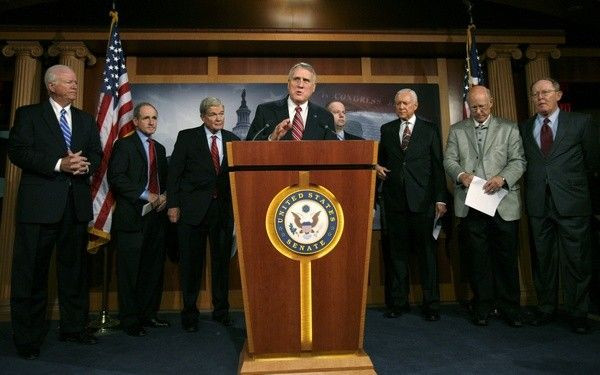Senate debates arms control treaty

The U.S. Senate opens debate on the START Treaty this morning, with the Democrats needing one more vote to ensure passage.
Nine Republican Senators joined 55 Democrats and two Independents to tally 66 votes on Wednesday in favor of bringing the matter to the floor for debate. That procedure required only 60 yea votes or a three/fifths majority. But ratification of the treaty requires a two/thirds majority, or 67 votes.
Sen. Evan Bayh, D-IN, was absent for the cloture vote but has indicated that he will support the treaty, so the votes for ratification appear to be there.
This is the time and this is the moment when the United States Senate needs to stand up and be counted on an issue of national security for our country, said Sen. John Kerry, D-MA, who is chairman of the Senate Foreign Relations Committee.
Kerry said the debate has been a long time coming and that the meetings, briefings, and hearings have been exhaustive. The questions have been answered.
The only question that remains is whether or not we will be remembered for approving New START and making America safer, or for finding excuses to delay and defer our core responsibility as Senators, Kerry said.
According to Kerry, the U.S. and Russia currently have more than 90 percent of the world's nuclear weapons.
According to the new treaty, each side would be allowed 1,550 deployed warheads, 700 deployed delivery vehicles, and 800 deployed and non-deployed launchers. A deployed weapon is one that is ready for use, and a non-deployed launcher is one that is part of a test or training facility.
If the new START is approved and goes into effect, it will lower the nuclear arsenals in each nation by roughly 30 percent from the last agreement.
Experts say that lowering arsenals - thus cutting down on the possibility of an accident or a terrorist organization obtaining a deadly weapon -- is only one of the ways the treaty makes the world a safer place.
START also sets an example for the rest of the world that the two major nuclear powers are getting along with each other and encourages nations to adhere to outstanding nonproliferation pacts. In addition, the treaty allows for each side to verify the arsenal levels of the other nation, something neither the U.S. or Russia has been able to do since the last START expired over a year ago.
I am persuaded that this treaty will enable our intelligence community to effectively monitor how Russia is reducing and deploying its strategic arsenal, Sen. Dianne Feinstein, D-CA, said. It has been more than a year since American inspectors were on the ground in Russia, and as a result we have less insight into any new Russian weapons and delivery systems that might be entering their force. We must act quickly to ratify New START before our national security suffers further.
Democrats were surprised by Republican opposition to the treaty, expressed last month by Sen. Jon Kyl, R-AZ, who said he needed to study it further and that he doubted the Senate could deal with the treaty in lame duck.
Democrats had supposed Republicans were onboard with the pact that President Obama and Russian President Dmitry Medvedev had agreed to in April. Current military leadership and numerous former high-level Republican officials are in favor of the treaty.
But Republican victories in the mid-term elections changed the dynamic. Any matter postponed to next year will be dealt with by a Congress with a stronger Republican presence. And there is political hay to be made by embarrassing President Obama, who had promised Russia the treaty would be ratified this year.
When Democrats sought to debate the treaty on Wednesday, Sen. Jim DeMint, R-SC, said he would read the entire treaty into the record, an exercise that would eat up about 12 hours at a point when the Senate has precious little time to accomplish anything before the year is out. DeMint's threat brought an angry retort from the White House.
This is a new low in putting political stunts ahead of our national security, and it is exactly the kind of Washington game-playing that the American people are sick of, White House press secretary Robert Gibbs said.
This Treaty has been the subject of nearly 20 Senate hearings and 1,000 questions, and is supported by President George H.W. Bush, every living Republican Secretary of State, our NATO allies, and the military leadership of the United States of America, Gibbs said. Every minute that the START Treaty is being read on the Senate floor increases the time that we lack verification of Russia's nuclear arsenal. It is the height of hypocrisy to complain that there is not enough time to consider this Treaty, while wasting so much time reading aloud a document that was submitted to the Senate months ago.
When Democrats said they would wait until Thursday to begin debate, DeMint relented.
The question of dealing with the START Treaty in lame duck has revealed a split in the Republican Party between pragmatic and ultra-conservative elements.
Six former Secretaries of State under GOP presidents -- Henry Kissinger, George Shultz, James Baker, Lawrence Eagleburger, Colin Powell and Condolezza Rice - support the treaty, while five Republicans who are considering a run for the presidency in 2012 - Newt Gingrich, Sarah Palin, Mitt Romney, John Thune and Tim Pawlenty - are against the treaty in its current form.
The Republican Senators who voted to bering the issue to the floor are John McCain, AZ, Richard Lugar, IN, Susan Collins, ME, Olympia Snowe, ME, Lindsay Graham, SC, Scott Brown, MA, Robert Bennett, UT, Lisa Murkowski, R-AK and George Voinovich, R-OH.
Debate is expected to continue through today, with a vote coming possibly later today or tomorrow.
© Copyright IBTimes 2025. All rights reserved.





















